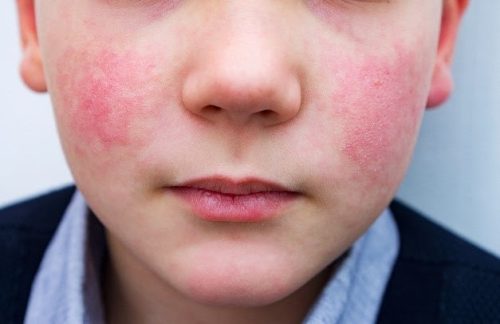CDC Issues Health Alert About Increase in Parvovirus B19 Activity in the US
 You’ve more than likely heard of the parvovirus in dogs.
You’ve more than likely heard of the parvovirus in dogs.
Now the Centers for Disease Control in Atlanta has released information about a parvovirus that affects humans.
It’s called Parvovirus B19 and the CDC has issued a Health Alert this month to notify healthcare providers, public health authorities, and the public about the increases in parvovirus B19 activity in the United States.
The CDC issued a Health Alert this month to notify healthcare providers, public health authorities, and the public about the increases in parvovirus B19 activity in the United States.
Parvovirus B19 is a respiratory virus transmitted through respiratory droplets, blood or blood products, and during pregnancy from mother to baby.
Parvovirus B19 is highly transmissible in respiratory droplets, with 50% of susceptible people infected after household exposure and 20–50% of susceptible students and staff infected during school outbreaks. Historically, people working in schools and in close contact with children (e.g., daycare workers and teachers) have had a high occupational risk of infection.
Symptoms can include a rash on the face, fever, headache, cough, sore throat, and joint pain and swelling.
Infection usually causes no symptoms or mild illness, such as flu-like symptoms, rash, and joint pain.
However, it can cause serious complications for high-risk groups.
Women who are pregnant, people with a weakened immune system, or have certain blood disorders (such as sickle cell disease), should talk to their healthcare provider if they are experiencing flu-like symptoms or might have been exposed to someone with parvovirus B19.
In the United States, people tend to get infected with parvovirus B19 more often in late winter, spring, and early summer. Minor outbreaks of parvovirus B19 infection occur about every 3 to 4 years.
There is no vaccine or treatment that can prevent parvovirus B19 infection.
However, there are steps you can take to prevent the spread of parvovirus B19 and other respiratory viruses, such as washing your hands frequently, covering your mouth when you cough or sneeze, and wearing a mask when you are out in public if you have a weakened immune system.
Since parvovirus B19 only infects people, a person cannot get the virus from a dog or cat.
Also, dogs and cats cannot get parvovirus B19 from an infected person.
Dogs and cats however can get infected with other parvoviruses that do not infect people.
